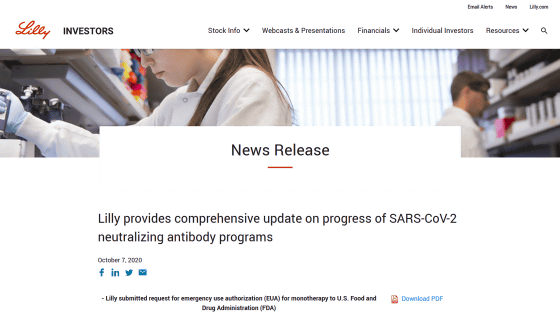Clinical trials show that 'antibody cocktails' are effective against new coronavirus infections

A '
Lilly provides comprehensive update on progress of SARS-CoV-2 neutralizing antibody programs | Eli Lilly and Company
https://investor.lilly.com/news-releases/news-release-details/lilly-provides-comprehensive-update-progress-sars-cov-2

Eli Lilly says its monoclonal antibody cocktail is effective against Covid-19
https://www.statnews.com/2020/10/07/eli-lilly-monoclonal-antibody-cocktail-covid-19/
Monoclonal antibodies, unlike polyclonal antibodies obtained from the serum of animals that have been administered the antigen, are made from clones derived from a single antibody-producing cell. Therefore, it is characterized by a single antigen specificity compared to polyclonal antibodies that contain antibody molecules with different antigen specificities.
Monoclonal antibodies are also considered to be promising as therapeutic agents for COVID-19, and scientists from various countries are conducting research. When asked about a treatment for COVID-19 in an interview in July 2020, Bill Gates also said, 'Monclonal antibodies are probably the most promising type. Regeneron, Eli Lilly and AstraZeneca are doing strong research. '.
Bill Gates says mortality rate for the new Corona will decrease by the end of 2020-GIGAZINE

Eli Lilly, which is conducting research on COVID-19 therapeutic agents using monoclonal antibodies, has developed ' LY- ' as a COVID-19 monoclonal antibody therapeutic agent for COVID-19 patients with mild to moderate symptoms. A clinical trial was conducted in which ' CoV555 ' and ' LY-CoV016 ' were administered simultaneously as a 'cocktail'. The patients included were not hospitalized at the start of the clinical trial, 112 patients received 2.8 g each of LY-CoV016 and LY-CoV016, and 156 patients in the control group received placebo. It was administered.
As a result of continued treatment, the virus was almost completely undetected by the 11th day in most patients, including the control group. On the other hand, it was confirmed that the viral load of the patients who received the monoclonal antibody therapeutic drug was significantly reduced as compared with the control group by the measurement on the 3rd and 7th days.
Symptom improvement was also observed in patients receiving monoclonal antibody treatments on day 3, and the rate of hospitalization and emergency room entry due to symptoms decreased. The percentage of patients hospitalized or in the emergency room with COVID-19 symptoms during clinical trials was 0.9% in the monoclonal antibody therapeutic group and 5.8% in the placebo group. .. In addition, it seems that this difference is not statistically significant.
Eli Lilly claims that there are few side effects from monoclonal antibody treatments, as no serious drug-related adverse events were identified in this clinical trial. He has already talked to national regulators about monoclonal antibody treatments and may be fully approved by the US Food and Drug Administration (FDA) by mid-2021. Eli Lilly says it is preparing to publish clinical trial data in a peer-reviewed journal.

The results of clinical trials using two types of monoclonal antibody therapeutic agents announced by Eli Lilly are consistent with the results of clinical trials announced by American biotechnology company Regeneron at the end of September 2020.
The monoclonal antibody therapeutic cocktail developed by Regeneron is also known to have been administered to President Donald Trump, who was infected with the new coronavirus.
CNN.co.jp: Administered to President Trump, what is Regeneron's 'antibody cocktail'?
https://www.cnn.co.jp/usa/35160427.html

Related Posts:
in Science, Posted by log1h_ik







